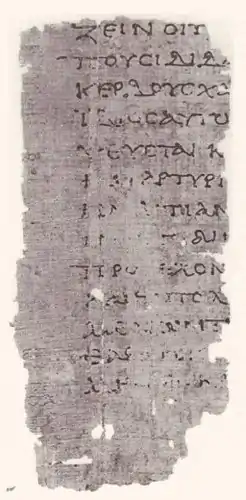Titus 2
Titus 2 is the second chapter of the Epistle to Titus in the New Testament of the Christian Bible. The letter is traditionally attributed to Paul the Apostle, sent from Nicopolis of Macedonia (Roman province), addressed to Titus in Crete.[1][2] There are charges that it is the work of an anonymous follower, after Paul's death in the first century AD.[3][4] This chapter describes the qualities of members of the community and doctrinal statements regarding the death of Christ in relation to the removal of sin.[5]
| Titus 2 | |
|---|---|
 Fragments of the Epistle to Titus 1:11-15 on Papyrus 32, from ca. AD 200. | |
| Book | Epistle to Titus |
| Category | Pauline epistles |
| Christian Bible part | New Testament |
| Order in the Christian part | 17 |
Text
The original text was written in Koine Greek. This chapter is divided into 15 verses.
Textual witnesses
Some early manuscripts containing the text of this chapter are:
- Papyrus 32 (~AD 200; extant verses 3-8)
- Codex Sinaiticus (330-360)
- Codex Alexandrinus (400-440)
- Codex Ephraemi Rescriptus (~450; complete)
- Codex Freerianus (~450; extant verses 4-6, 14-15)
- Codex Claromontanus (~550)
- Codex Coislinianus (~550; extant verses 1–5)
Membership of the Community (2:1–10)
This section contains the injunction to Titus to teach the sound doctrine to the community with a list of qualities and duties for the members.[5]
Doctrinal statements (2:11–15)
The doctrinal statements in this part is typical of Paul's teaching which links the incarnation and sacrifice of Christ to the hope and expectation of his second coming.[5]
Verse 11
- For the grace of God that brings salvation has appeared to all men,[6]
- "The grace of God that brings salvation": This "grace of God" does not mean God's free love, for though that it is the source of salvation, is not made manifest to all men, but only to the Lord's own people.[7] Neither does it mean the grace of God within the hearts of believers, for though salvation is strictly connected with it, and it powerfully influences the lives of the partakers of it, yet it has not appeared to all men.[7] This grace of God is intended the doctrine of grace, the Gospel, because it is a declaration of the grace of God, and of salvation by it: and in the hand of the Spirit, it is the means of conveying grace and implanting into the heart (cf. Acts 20:24; 2 Corinthians 6:1; Hebrews 12:15 which is called the 'Gospel of salvation', the good word or good news of salvation; it shows men the way of salvation; it gives an account of the Savior himself, the great God, fit to be a Savior and he is the only Savior. Some read this clause, "that brings salvation to all men", supported by the Syriac version, which renders it "that quickeneth" or "saveth all"; Arabic version is also the same.[7]
- "Has appeared to all men": indicates that it has been hidden, in the shadows of the ceremonial law of the Old Testament, and it was entirely hidden from the Gentiles, was not known as it is now. The Gospel had been like a candle lighted up in one part of the world, that is, only in Judea, but now it shines out and appears to all sorts of people, rich and poor, bond and free, masters and servants; which sense well agrees with the context (Titus 2:2–4; Titus 2:6; Titus 2:9; Titus 2:10), because the Gospel was now preached to every creature under heaven, or to the whole creation and had reached the hearts of all people, including those who sat in darkness, and in the shadow of death; namely, to the Gentiles, pursuant to the commission in (Mark 16:15).[7]
Verse 15
- Speak these things, exhort, and rebuke with all authority.
- Let no one despise you.[8]
This summary command to Titus contains previously mentioned three didactic terms:
- "speak/teach" (in 2:1) about "these things", referring to the matters in the preceding paragraphs (2:1–14)
- "exhort/encourage" (in 2:6)
- "rebuke/reproof" (in 1:13)
recalling 'the job description of the overseer' (1:9) which Titus must do himself.[9]
- "Let no one despise you": is an indirect command in the third person to strengthen Titus, which is similar in form and content to 1 Timothy 4:12 for Timothy.[10] Towner offers a paraphrase: "Titus, even if someone disrespects your authority, do not be dissuaded from your task."[10]
See also
- Jesus
- Related Bible parts: 1 Timothy 3
References
- Harris, Stephen L., Understanding the Bible. Palo Alto: Mayfield. 1985.
- King James Version subscription after Titus 3:15 states "It was written to Titus, ordained the first bishop of the church of the Cretians, from Nicopolis of Macedonia."
- S.J., Felix Just. "Deutero-Pauline Letters". catholic-resources.org.
- Drury 2007, p. 1220.
- Drury 2007, p. 1232.
- Titus 2:11 NKJV
- "Titus 2:11 - Meaning and Commentary on Bible Verse". biblestudytools.com.
- Titus 2:15 NKJV
- Towner 2006, p. 766.
- Towner 2006, p. 767.
Bibliography
- Drury, Clare (2007). "73. The Pastoral Epistles". In Barton, John; Muddiman, John (eds.). The Oxford Bible Commentary (first (paperback) ed.). Oxford University Press. pp. 1220–1233. ISBN 978-0199277186. Retrieved February 6, 2019.
- Towner, Philip H. (2006). Bruce, Frederick Fyvie (ed.). The Letters to Timothy and Titus. The New International Commentary on the New Testament. Wm. B. Eerdmans Publishing. ISBN 9780802825131.
External links
- Titus 2 King James Bible - Wikisource
- English Translation with Parallel Latin Vulgate
- Online Bible at GospelHall.org (ESV, KJV, Darby, American Standard Version, Bible in Basic English)
- Multiple bible versions at Bible Gateway (NKJV, NIV, NRSV etc.)
- Titus 2 sermon The Power of God's Grace